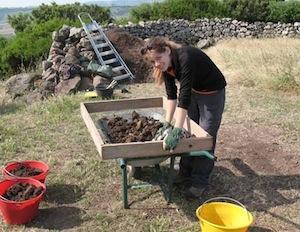Susan Palazzo
B.S. University of Michigan 2010
Specialties
Sardinia and southern mainland Italy; Mediterranean archaeology; faunal analysis; foodways; colonial situations; identity; non-elite households; cultural transitions
I received a BS in biology with minors in classical archaeology and German from the University of Michigan (2010). In 2006 I became involved in the Pompeii Archaeological Research Project: Porta Stabia (see link below) as a member of the environmental team collecting, processing, and analyzing faunal material from the site. As of 2012 I am responsible for leading the environmental team in the field. I have also excavated on the island of Sardinia as part of Progetto Pran’e Siddi and in Tuscany at the Roman villa of Poggio del Molino. My current research focuses on the Nuragic culture on Sardinia during the Late Bronze Age and Early Iron Age (first millennium BC). I am interested in how foodways are linked to identity and how changes in identity are revealed in changing foodways as Sardinia is exposed to multiple colonial groups (Phoenicians, Carthaginians, Romans, etc.). My primary questions are: What does colonialism look like in the archaeological record? How do foodways reveal colonial patterns in comparison to other intentionally fashioned materials such as ceramics, architecture, metal objects, etc.?
A postcolonial perspective on the study of colonialism in archaeology reveals the need to form a more flexible or inclusive theoretical framework for the archaeology of colonial encounters, which are processes rather than events and rarely clear-cut to begin with. Examples of colonial situations drawn from the island of Sardinia demonstrate the range of interactions that can be addressed within the framework of colonialism. Studying colonial situations entails recognizing social groups in the archaeological record which is difficult because it means searching for identity. Foodways offer a potential solution to this problem in that they often travel with people. Food has an active social role and is involved in constant group negotiation, constraint, and change and is therefore a potent symbol of identity. Foodways are uniquely positioned to be a better indicator of identity than other material remains. Addressing questions about the impact of the colonial process on foodways, both indigenous and colonial, will potentially provide insight into other realms of the ancient culture such as kinship, marriage patterns, and economy, and political organization within the context of colonial entanglements.
